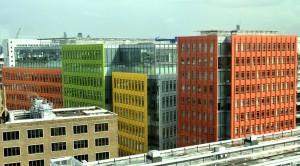
On Tuesday
Steve and I went up to London for an Alumni Engagement Cluster Meeting with colleagues from the Glasgow SAVE project and UWIC’s GradSpace project. Although most of us had met at the initial start-up meeting back in April and exchanged a few emails since, this was our first proper face-to-face meeting. It was also a chance to meet Peter Kawalek , our Critical Friend, and Pete Speak the latest recruit to the Glasgow SAVE project.
I confess that I was slightly sceptical as to how much common ground there was between the projects and had wondered how useful this meeting would be. But at least we didn’t have to schlepp all the way from Glasgow or Cardiff. However, it quickly became apparent that getting together informally in this way was very useful and supportive. Many of the problems we had experienced were also an issue for the other projects and it helped to discuss how others had risen to the challenge. This felt like a ‘safe’ space to be honest about project issues we were worried about and a good place to share our successes with colleagues who understood the challenges we faced. All three projects (if I can be immodest for a second) demonstrated that a lot had been acheived since the start up only five months ago. Steve and I came away feeling that between us all we were putting together valuable resources that would not only benefit our students and alumni but also act as a template for other Higher Education institutions.
During our discussions I found myself thinking about how the recommendations from the Logins for Life project were relevant to the alumni engagement projects. Allowing graduates to retain their IT accounts beyond their time at university would go a long way towards solving the problem of alumni authentication. This would help with those graduating now and in the future but we also discussed the issue of re-engaging with alumni where contact had been lost. How do we check that these are really alumni of our university? From here the discussion went wider. Do we always need to authenticate alumni? Or could we offer free resources to anyone who is interested? That will depend on what sort of service we are offering. If we are ‘brokering’ contact between prospective employers and Kent graduates then of course we do need to make sure they are actually Kent graduates. But there are perhaps other services we could provide along the lines of the UWIC GradSpace offering, which could be available to all. There are many Open Education resources available which could improve employability and making these available all in one place to all-comers would enhance the reputation of Kent as an institution that encourages life-long personal development and offers much more than ‘just fee charging courses’. It could help to expand and strengthen the much talked about ‘Kent community’. It is plain that the jobs market is challenging at the moment and shows few signs of improving in the short term. There is little doubt that additional services for graduates, which might just give a job applicant the edge, are going to be much in demand.
Whatever services universities offer in the future, the cluster group meeting broadened our thinking about alumni engagement and that has got to be a good thing.
